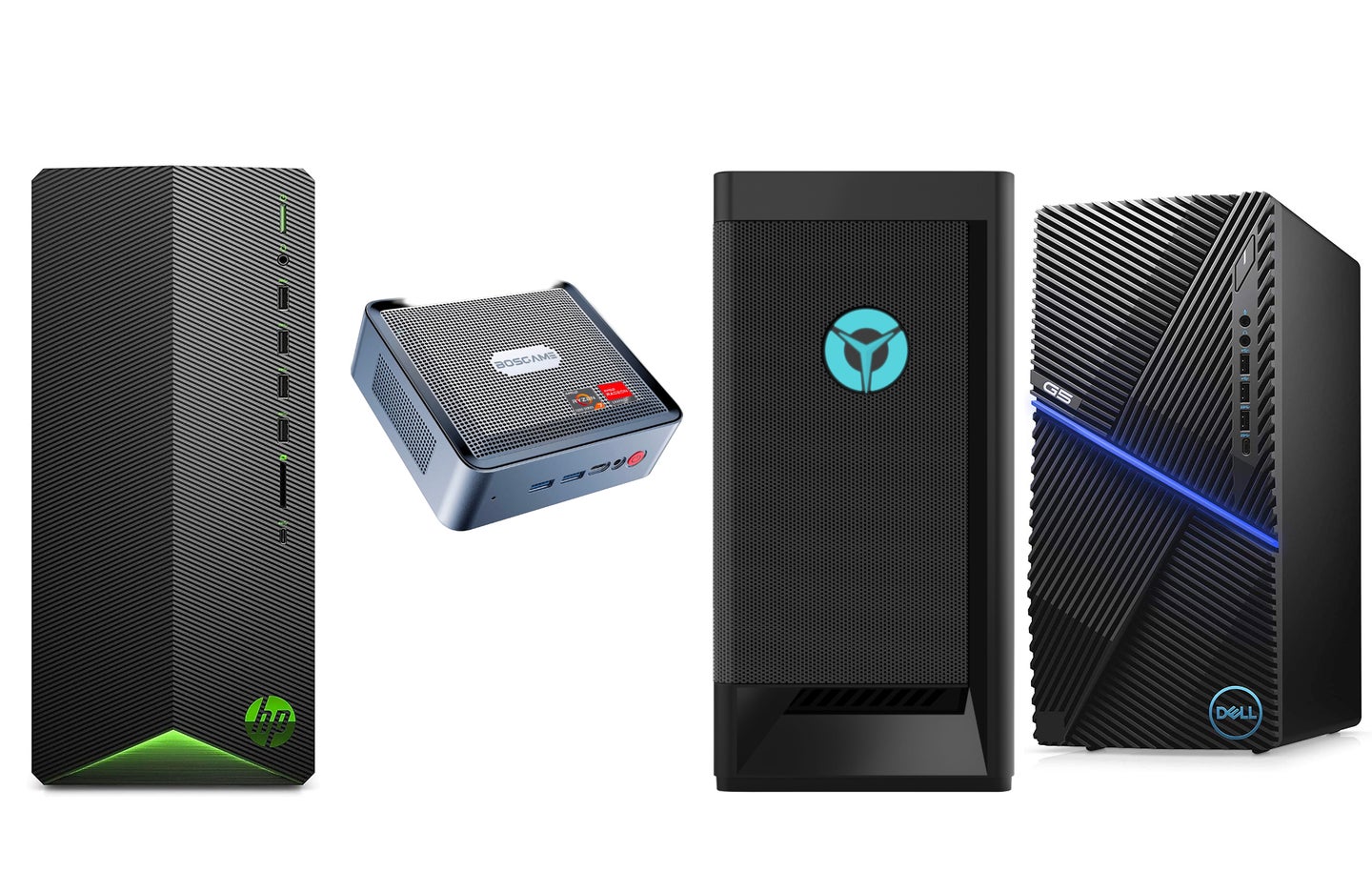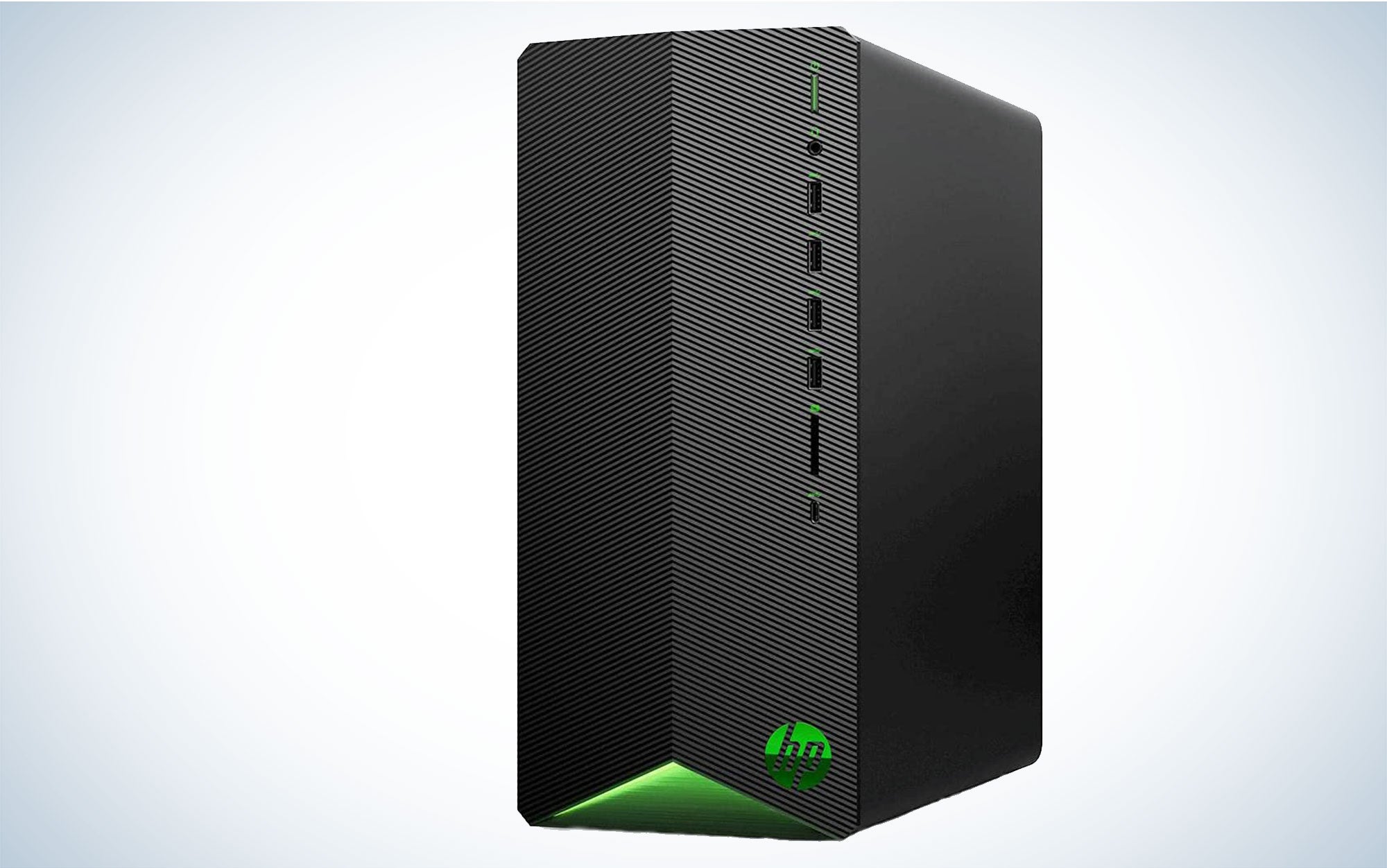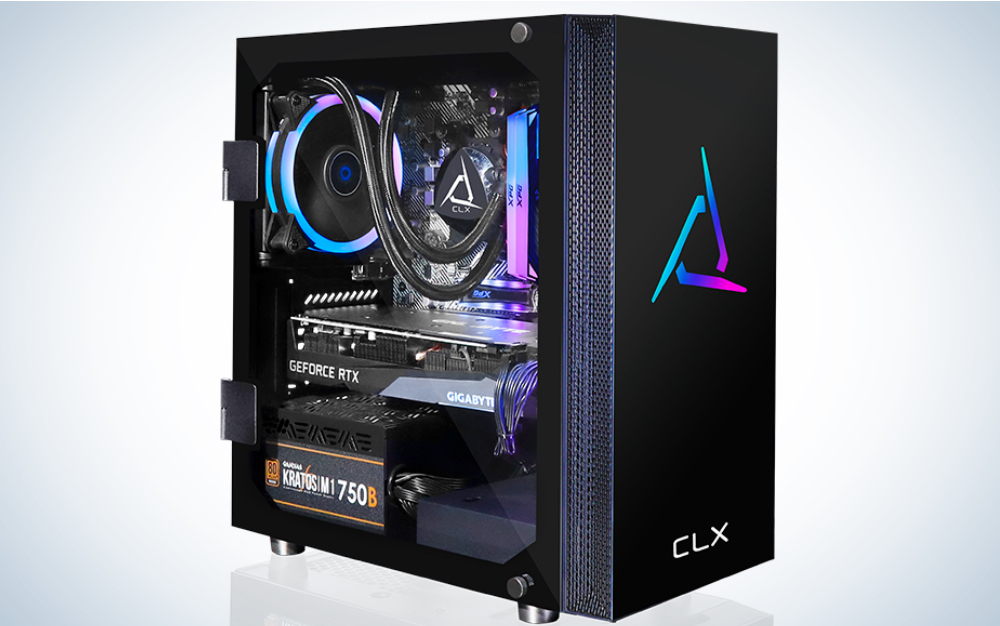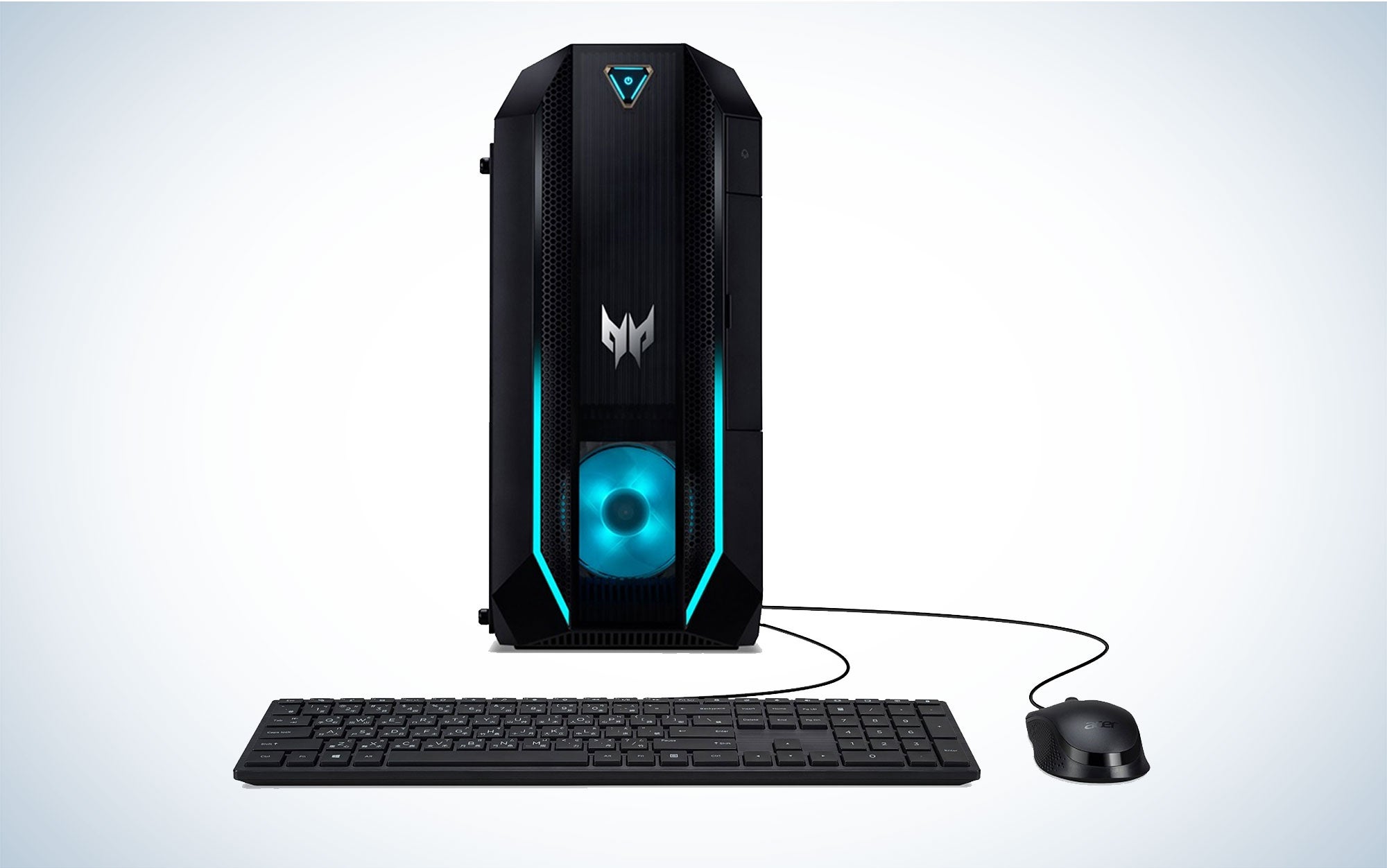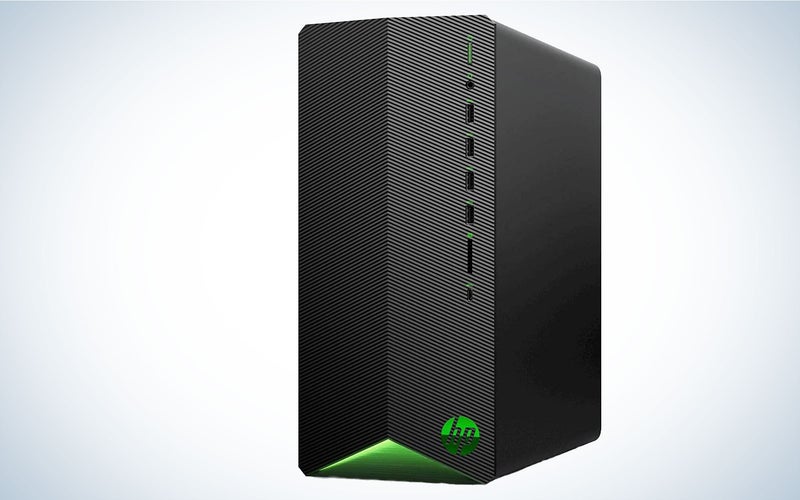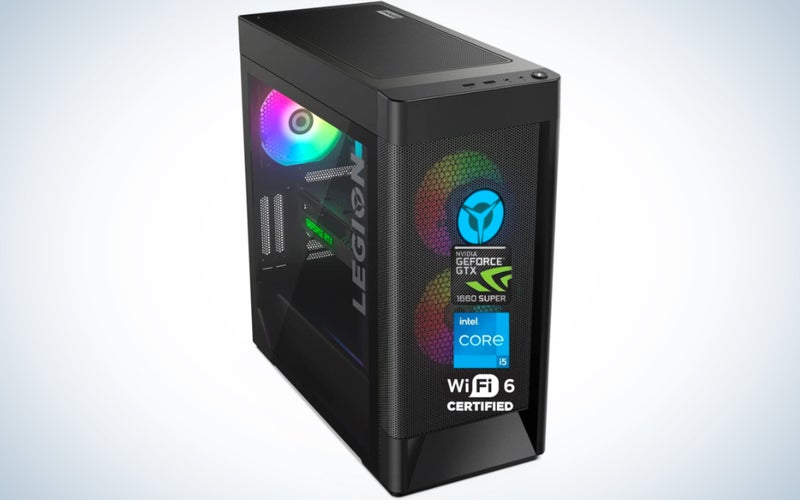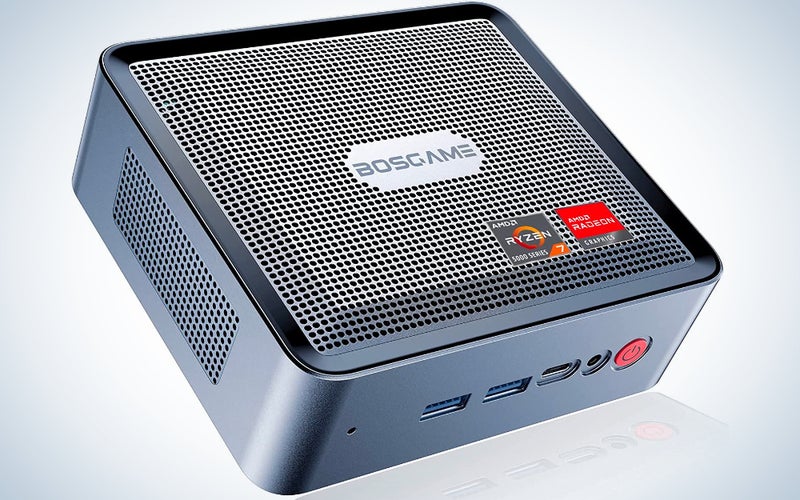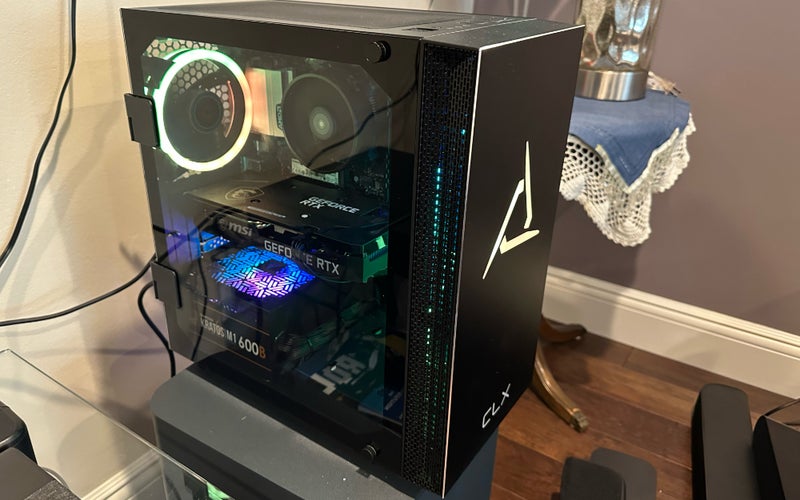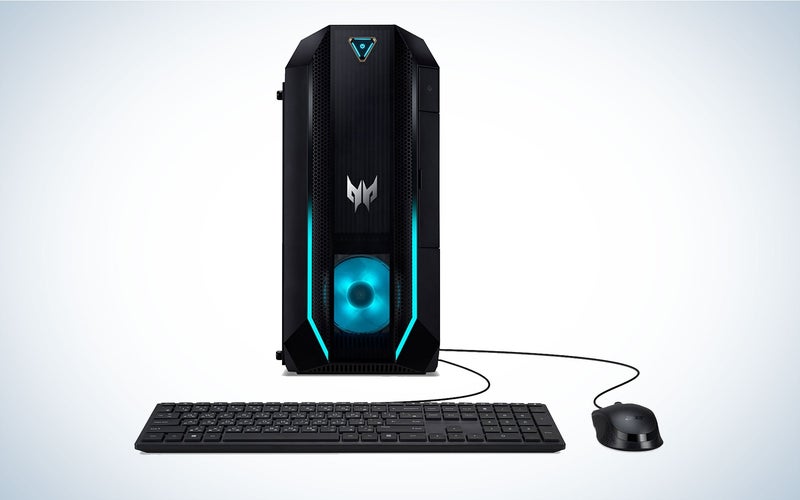We may earn revenue from the products available on this page and participate in affiliate programs. Learn more ›
PC gaming and gaming PCs have never been so exciting. Over the last few years, we’ve seen an explosion of new technologies like ray tracing and intelligent upscaling, which make games look and play better than ever before. Diving into the PC gaming world can seem daunting and expensive, but it doesn’t need to be. Whether you’re looking to get lost in New World or stay up until the wee hours with just “one more turn” in Civilization VI, we’ve rounded up the best cheap gaming PCs to get you gaming without breaking the bank. These PCs can make excellent gifts if you’ve got a serious gamer in your life (it can be yourself) but are on a tighter budget. We even have a compact gaming PC if they’re short of space but still want to play titles on Steam rather than stores created by Microsoft, Sony, or Nintendo. The best cheap gaming PCs also allow your favorite gamer to play non-console games on their big screen.
- Best overall: HP Pavilion Gaming Desktop TG01-2170m
- Best for content creators: Lenovo Legion Tower 5i
- Best compact PC: BOSGAME Mini PC
- Best for work and play: CLX Set Battlebox
- Best budget: Acer Predator Orion 3000
How we chose the best cheap gaming PCs
I’ve been a PC builder for more than 15 years and a tech critic for IGN, Tom’s Hardware, PC Perspective, and MMORPG.com for over half a decade. In that time, I’ve become intimately familiar with the components that make gaming PCs tick. A high price doesn’t always mean the best performance, and a low price doesn’t necessarily mean good value. So, for this round-up, I’ve scoured retail sites with an eye toward the hardware inside each machine. After finding the best bang for the buck in each product category, I looked closely at user reviews to identify any red flags, such as poor packaging or carelessness in the build process.
The best cheap gaming PCs: Reviews & recommendations
Now you know what to look for to ensure the optimum experience at the best price. Here’s our selection of the best cheap gaming laptops we’ve found for around $1,000. In most cases, you can upgrade if the model you selected doesn’t have all the features you want.
Best overall: HP Pavilion Gaming Desktop TG01-2170m
Why it made the cut: The HP Pavilion TG01-2170m offers great performance, even in the latest games.
Specs
- Price: $1009.99
- CPU: AMD Ryzen 3 5600G
- GPU: Nvidia GeForce RTX 3060
- Memory: 16GB
- Storage: 256GB
Pros
- Can be configured up to an RTX 3060
- Highly customizable
- Compact design
Cons
- Limited configuration options under $1,000 with the RTX 3060
- Small SSD
The HP Pavilion easily offers the overall best cheap gaming PC we’ve encountered. This configuration equips it with a powerful RTX 3060 and 16GB of RAM for $1,309, making it the most powerful gaming PC in our line-up. It’s capable of the best FPS of any machine we considered and can be pushed even further with only a slightly higher budget.
The stock prebuilt price here is higher than our target, but the good news is that you can go to HP’s online store and configure it with a much wider range of specs. If you’re willing to drop to a quad-core Ryzen 3 5300G, you can get the price down to an impressive $1,019. Of course, we’d recommend spending a little more to get a better processor or a bigger hard drive. No matter how much you spend, though, you can get a lot of machine for your money.
Best for streaming and content creation: Lenovo Legion Tower 5i
Lenovo
Why it made the cut: This PC delivers great 1080p frame rates and offers plentiful storage.
Specs
- Price: $1,139.99
- CPU: Intel Core i5-11500
- GPU: Nvidia GeForce GTX 1660 SUPER
- Memory: 32GB
- Storage: 1GB SSD, 2TB HDD
Pros
- Lots of storage
- Great GPU for 1080p gaming
- 6-core, 11th-gen Intel CPU
Cons
- Bland design
- Included accessories are generic
The Legion Tower 5i from Lenovo is easily the best cheap gaming PC for new content creators looking for a machine to let them try streaming on a budget. It comes equipped with a high-quality, modern Intel processor with enough cores to handle gaming and streaming simultaneously. Its Nvidia GTX 1660 SUPER has plenty of horsepower to run modern games at medium to high settings, ensuring your audience has the high-quality stream they crave. When it’s time to edit together your latest killstreak, it has space to spare with its 1TB SSD (perfect for installing your favorite game or two) and a 2TB hard drive for archiving video clips.
The one area where this PC feels limited is memory, as it only includes 32GB of system memory. This ensures great stream performance, especially if you want to monitor your chat in a second window. The rest of the system is uniquely suited to aspiring streamers, so we recommend it.
Best compact: BOSGAME Mini PC
Bosgame
Why it made the cut: Bosgame’s Mini PC is a tiny computer that can hide out behind your monitor but has the horsepower for both streaming and content creation.
Specs
- Price: $499.99
- CPU: Ryzen 7 5600H
- GPU: Integrated
- Memory: 16GB
- Storage: 512GB
Pros
- Powerful AMD Ryzen 7 CPU and 16GB of RAM
- Pint-sized
- 512GB NVMe SSD
Cons
- Integrated graphics only
The Bosgame Mini PC is tiny, but don’t mistake its small size for low power. This compact gaming PC can run most modern games at 1080P with medium settings enabled, and you may be able to eke out even more performance on a game-by-game basis. That’s largely due to the machine’s Ryzen 7 5800U 8-core processor, 16GB of RAM, and NVMe SSD. These are components we’d expect to see in computers that cost one to two hundred dollars more. AMD has put a lot of work into making its integrated graphics chips as powerful as possible, so while this Mini PC’s graphics card is its greatest liability, it’s by no means weak.
Bosgame went out of its way to equip its mini PC with a ton of ports. Three HDMI ports around the back allow you to connect this computer to three 4K monitors simultaneously, and the generous number of USB-A ports makes connecting peripherals a snap. We’re especially fond of the USB-A and USB-C ports on the front of this machine, which make plugging in a thumb drive much more convenient. If your gaming space and budget are both limited, Bosgame’s Mini PC may be all you need to play Steam games on your big screen.
Best for work and play: CLX Set Battlebox Gaming PC
Brandt Ranj / Popular Science
Why it made the cut: Getting a Battlebox Gaming PC from CLX will set you up for a long, long time.
Specs
- Price: $1,199
- CPU: AMD Ryzen 5 5600X
- GPU: GeForce RTX 3060
- Memory: 16GB
- Storage: 1TB SSD
Pros
- See-through case
- Excellent performance
- Designed to be upgraded
Cons
- Appearance won’t appeal to all
I checked out a budget-friendly CLX’s Battlebox Gaming PC build, and it’s certainly the computer I’d recommend to computer gaming enthusiasts. Its see-through case and RGB lighting immediately draw the eye but never got too distracting. If anything, it made my gaming setup more aesthetically pleasing even when it wasn’t turned on.
The benefit of choosing a gaming PC from CLX is the ability to customize its components to suit your needs. This is a common practice for all PC makers, but CLX specializes in gaming hardware, so you’re only given a few choices for each component that would impact how smooth games run.
My PC gaming needs are admittedly modest, and I spent my time playing through indie games like Tunic and Hi-Fi Rush along with older titles from my backlog, like the somewhat-recent 4K remaster of Star Ocean: The Last Hope. These games ran smoothly and accessing the Xbox and Steam apps to access my library was trivially easy.
The CLX build I was given to test was certainly powerful enough to play games like Elden Ring or the upcoming Resident Evil 4 remake with plenty of headroom to spare. On a similar note, popping off the side panel of this PC build was easy, and we immediately had access to all of the computer’s core components. If you’re looking for a gaming PC that’ll last a long time but was also designed to be upgraded when your needs change, this is a great choice.
Best budget: Acer Predator Orion 3000
Why it made the cut: The Acer Predator Orion 3000 brings specs that will let new players explore what makes PC gaming great.
Specs
- Price: $1,299
- CPU: Intel Core i7
- GPU: Nvidia GeForce RTX 3070
- Memory: 16GB
- Storage: 1TB
Pros
- 6-core, 11th-gen Intel CPU
- Great graphics card for 1080p gameplay
- Slick but not overstated look
Cons
- Included mouse and keyboard are unimpressive
For new PC gamers looking for the best cheap gaming PC for beginners, Acer has one of the most compelling bundle packages we’ve come across with the Predator Orion 3000. The desktop expertly balances price, performance, and aesthetics, making for a superb introduction to PC gaming. It has specs capable of streaming, light video editing, and, of course, playing modern PC games. The Predator Orion 3000 bundle also comes with a mouse and keyboard, so all you’ll need is a monitor to get started.
One of the highlights of this system is its subdued yet stylish look. It doesn’t overdo it with RGB lighting, but its blue front fan and slim LED strips make it clear that this machine is purpose-built for PC gaming. If you’re shopping for a PC gamer who may not have their style preferences set in stone, this is a great entry point.
The biggest drawbacks to this machine are the generic, unimpressive quality of its included peripherals. And there are great gaming mice and gaming keyboards available when you’re ready to upgrade.
Things to consider before buying a cheap gaming PC
Shopping for a gaming PC on a budget can be a confusing mix of big promises and perplexing specs. It’s important to know what matters most so you can cut through the hype and find a PC that will perform the way you expect it to. When buying a prebuilt gaming PC, the core components are just part of the picture. You also need to remember its capacity to take on upgrades and other factors. Here’s what to keep an eye on when shopping around.
Graphics card (GPU)
The most important element of any gaming PC is its graphics card. The graphics card, or GPU, is responsible for rendering 3D graphics and is the most influential factor in how many FPS you’ll see in different games. If you spend extra money on a feature, it’s worth your while to get a PC with a more capable graphic card.
Two companies design different types of graphics cards: Nvidia and AMD. They license out their graphics processors to third-party manufacturers, such as EVGA and Sapphire, who create their own versions of each card with specs. These cards are broken into different standardized performance tiers.
For Nvidia, the first two numbers indicate the card generation, and the third number specifies the caliber of the card. Nvidia current “30”-generation cards include the RTX 3050, RTX 3060, 3070, 3080, and 3090.
For AMD’s Radeon cards, the first number indicates the generation, and the second specifies the card’s power. AMD’s current Radeon cards include the 6600, 6700, 6800, and 6900.
Both companies also include half steps, which offer slightly better performance than the base model. For Nvidia, these are noted with the “Ti” or “Super” branding. For AMD, it’s “XT.”
The most important thing to consider when comparing different versions of the same GPU “make,” such as an Nvidia RTX 3060 or AMD Radeon 6700, is heat. When shopping for a less expensive GPU, a prerequisite for getting a cheap gaming PC, try to avoid GPUs with only one fan or ultra-slim designs. While they may be fine, it is more possible to push a low-end graphics card so hard that it slows down due to “thermal throttling.”
Processor (CPU)
You’ll also want to give some thought to the central processing unit, or CPU. As with graphics cards, there are two primary manufacturers for processors: AMD and Intel. Both companies have a vast catalog of processors that may show up in cheap gaming PC configurations, but AMD’s Ryzen processors or Intel’s Core processors tend to be the most common. Like GPUs, each brand breaks its chips into different performance tiers that ascend in power as their number grows. For Intel, that’s Core i3, Core i5, Core i7, and Core i9. For AMD, that’s Ryzen 3, Ryzen 5, Ryzen 7, and Ryzen 9. For gaming, we recommend sticking to Intel Core i5 and Ryzen 5 CPUs and above if possible.
When deciding which CPU is the best fit for your cheap gaming PC, it’s important to consider exactly what you plan to do with it. While some modern games work better with higher core counts, for pure gaming, a quad-core CPU is probably good enough. If you plan to stream or multitask with video or audio editing software, it’s wise to save up and go for at least six cores to prevent any potential bottlenecks.
You should also pay attention to the processing speed, measured in GHz. That indicates how many processing cycles a processor can compute per second. For gaming, it’s wise to target the 4GHz to 5GHz range or above (that’s 4 billion to 5 billion processing cycles per second). Many games benefit from higher clock speeds over higher core counts, so higher speed can often result in higher FPS.
Finally, the generation of processors can also affect your CPU’s performance. New generations of processors often add new features that improve performance in addition to adding more power. As a rule, it’s best to decide on how many cores you need first and then buy the fastest, newest CPU you can afford after that.
Memory (RAM)
Memory is another critical component. Whether you’re gaming, streaming, or just browsing the web with a dozen different tabs open, once your memory fills up, system performance suffers. In 2022, you need at least 8GB of RAM. Realistically, 16GB is the current “sweet spot” for both price and performance but may be hard to find in a less expensive system. Luckily, it is also one of the easiest and most affordable PC upgrades. You can even add more memory yourself.
Storage (HDD, SSD, NVMe)
Games are getting bigger every year, so it’s important to consider how much and what kind of storage you’ll need for the games you want to play. Broadly, there are three kinds of hard drives you should be aware of: mechanical hard drives (HDDs), solid-state drives (SSDs), and NVMe drives. Mechanical hard drives are, by far, the slowest but offer the best capacity per dollar. NVMe drives are the fastest but most expensive. Solid-state drives are a middle ground between price and performance.
When choosing a gaming PC, try to find one with at least an SSD to run your operating system and most-played games. Compared to traditional hard drives, using an SSD as your primary hard drive reduces in-game load times and makes the entire system feel faster and more responsive. Many cheap gaming PCs will feature smaller SSDs, so you may need to swap out which games are installed on them as you finish and move on to new titles.
The other big thing to consider is how much storage you’ll need altogether. Games are bigger than ever. Call of Duty: Black Ops Cold War, for example, can easily occupy more than 200GB, so settling on a PC with a 256GB hard drive wouldn’t be a good choice for Call of Duty fans. Look at the recommended storage requirements for your favorite games to get an estimate for how much storage space you require. Modern PCs generally have room for many internal hard drives so some gaming PCs may come with a small SSD and larger HDD. You can also install extra hard drives if you’re open to the idea of upgrading on your own.
Monitors, peripherals, and other accessories
If it’s your first time buying a prebuilt gaming PC, you might be surprised to find that prebuilt gaming PCs often don’t come with a mouse and keyboard, and only rarely include a monitor with the tower. Be sure to read the product listing carefully to identify exactly what is included with your purchase.
Though it might not seem so at first, separating the price of the PC from these accessories can actually be a good thing. When you’re purchasing a cheap gaming PC, you want every spare dollar to be invested in the hardware to improve the gaming experience. Often, any accessories that come with a prebuilt PC are poorly made and among the first things you’ll want to replace in a new setup. This isn’t always the case: Sometimes pack-ins can genuinely enhance the value of a PC bundle but look carefully at the whole package when buying a bundle—sometimes the “added value” of the accessories isn’t worth the savings.
Packaging, build quality, and warranty support
One of the most important factors to consider in buying a prebuilt gaming PC online is how well it will be built and how the vendor will actually ship it to you. Certain components, like the graphics card, should be secured during shipping to prevent damage to the motherboard. Other considerations, like cable management, can have a direct impact on the temperature of the PC and its performance in games. These elements are rarely included in online product listings, so it’s worth the extra time to read product reviews from real customers.
And even the best gaming PC can have problems. Read the warranty guarantee and user reports about how the company handles post-purchase support. This is also a case where investing in an extended warranty isn’t always a bad idea, especially if the factory warranty is only 30 days.
FAQs
Q: Is a gaming PC worth it?
Of course! The world of PC gaming is rich, diverse, and at the cutting edge of game development. Since PCs don’t release in generations the way consoles do and the barriers to entry for developers are fewer, there is a wider array of games to choose from. Many of the most popular games of the last five years have begun their lives on PC, such as PlayerUnknown’s Battlegrounds (PUBG). Likewise, if you want to experience the latest and greatest graphics video gaming has to offer, a PC is usually the first and best way to experience it. If that isn’t enough, PC gaming is notorious for its deep discounts and bundle sales through platforms like Steam, often making it the cheapest way to play games you may have missed when they were first released.
Q: Are cheap gaming PCs good for work?
A PC that’s great for gaming can still do other things. There are certain upgrades that everyone needs for gaming, but most people don’t need for work—like a graphics card; however, for most people, a gaming PC is really just a really, really powerful computer. Unless the cheap gaming PC is very old, it should be able to handle all of the spreadsheets, PowerPoint presentations, and essays you’d care to throw at it.
Q: Is a $500 gaming PC worth it?
At this time, I’d say no. Buying a $500 gaming PC usually means two things: old hardware and poor performance in modern games. Because the hardware tends to be older, finding upgrades can also be more difficult. Meanwhile, the PlayStation 5 and Xbox Series X provide incredible performance for the same $500. There are times, usually late in the PlayStation and Xbox consoles’ life cycles, when it makes sense to build a very cheap gaming PC rather than buying a console. Now is not one of those times.
Q: How much should a gaming PC cost?
This depends on the types of games you want to play, but if you’d like to game in HD at medium settings, there’s no reason to spend more than $500. If you want to play the latest titles at 4K with ray tracing turned on, you may need to spend upwards of $2,000.
Q: Can I build my own gaming PC?
Yes. The most cost-effective way to game on PC is to buy all the parts and assemble them yourself. Be sure to do your research if you go this route to ensure every component is compatible with one another.
Final thoughts on the best cheap gaming PCs
- Best overall: HP Pavilion Gaming Desktop TG01-2170m
- Best for content creators: Lenovo Legion Tower 5i
- Best compact PC: BOSGAME Mini PC
- Best for work and play: CLX Set Battlebox
- Best budget: Acer Predator Orion 3000
Buying a prebuilt gaming PC can be one of the best ways to join the PC gaming community. For users that aren’t comfortable building their own or are having trouble finding the components they need within their budget, a prebuilt machine can take the stress out of getting started and get you gaming faster.
As with any major tech purchase, there is a lot to consider when shopping for the best cheap gaming PC. Knowing the games you’d like to play, and how you’d like them to run, is the best place to begin and your guiding principle when shopping. Whether you’re just interested in seeing the best graphics possible within your budget or getting your feet wet as a streamer, there are plenty of options worthy of a closer look.
Why trust us
Popular Science started writing about technology more than 150 years ago. There was no such thing as “gadget writing” when we published our first issue in 1872, but if there was, our mission to demystify the world of innovation for everyday readers means we would have been all over it. Here in the present, PopSci is fully committed to helping readers navigate the increasingly intimidating array of devices on the market right now.
Our writers and editors have combined decades of experience covering and reviewing consumer electronics. We each have our own obsessive specialties—from high-end audio, to video games, to cameras, and beyond—but when we’re reviewing devices outside of our immediate wheelhouses, we do our best to seek out trustworthy voices and opinions to help guide people to the very best recommendations. We know we don’t know everything, but we’re excited to live through the analysis paralysis that internet shopping can spur so readers don’t have to.
